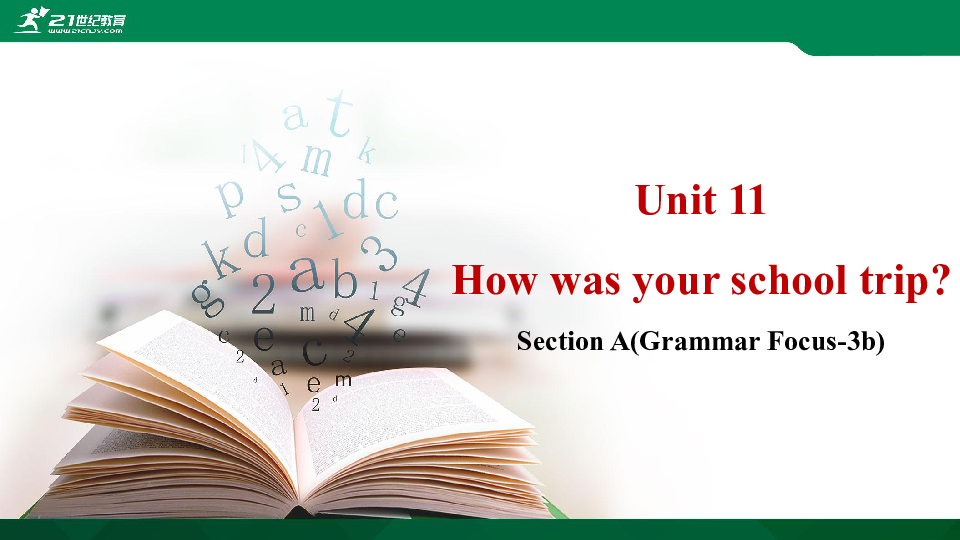
Unit 11 How was your school trip? Section A(Grammar Focus-3b) Talk about the picture. What can you see in the picture? Lead in How was your school trip? It was great! Did you go to the zoo? No, I didn't. I went to a farm. Did you see any cows? Yes, I did. I saw quite a lot. Did Carol ride a horse? No, she didn't. But she milked a cow. Were the strawberries good? Yes, they were./ No, they weren't. Grammar 一般过去时态 构成 用法 常用时间 动词的过去式 1、表示过去某个时 间发生的动作或 存在的状态。 2、表示过去经常或 反复发生的动作。 yesterday last night/week(end) in 1990 last Sunday morning two days ago 前 Grammar There _____six countries in SCO (上合组织) at first, but now the number has increased(增长) to eight. A. is B. are C. were D. will be C Let's Do It 注意: 表示过去经常或反复发生的动作时,常和often, alway等表示频率的副词连用。 典例 He always _____ to school by bus last month. A. go B. went C. going D. goes B Grammar 含有be 动词的一般过去时 肯定句 主语+was/were+ 其他. 否定句 主语+was/were+not+ 其他. 一般疑问句 Was/Were+ 主语+ 其他? 肯定回答:Yes, 主语+was/were. 否定回答:No, 主语+wasn’t/weren’ Grammar eg: Their party was very great yesterday. 昨天他们的派对非常棒。 The students weren’t at school just now. 刚才学生们不在学校。 —Were you at home last night? 昨天晚上你在家吗? —Yes, I was./No, I wasn’t. 是的, 我在家。/ 不, 我不在家。 典例 That actor was a farmer before.(改为否定句) That actor _____a farmer before. wasn’t Grammar 含有实义动词的一般过去时 肯定句 主语+ 动词过去式+ 其他. 否定句 主语+didn’t+ 动词原形+ 其他. 一般疑 问句 Did+ 主语+ 动词原形+ 其他? 肯定回答:Yes,主语+did. 否定回答:No,主语+didn’t 在一般过去时的疑问句中, 助动词did 后面的动词应用原形。 【注意】 Grammar eg: They listened to music just now. 刚才他们听音乐了。 → They didn’t listen to music just now. 刚才他们没听音乐。 → Did they listen to music just now? 刚才他们听音乐了吗? Yes, they did./No, they didn’t. 是的, 他们听了。/ 不, 他们没听。 Grammar 巧记动词过去时态 动词一般过去时,表示过去发生的事; be用was或用were, have,has变had; 谓语动词过去式,过去时间作标志; 一般动词加-ed,若是特殊得硬记。 否定句很简单,主语之后didn’t添; 疑问句也不难,did放在主语前; 如果谓语之前有did,谓语动词需还原; 动词若是was,were,否定其后not添。 Grammar Regular verbs Irregular verbs play→played visit→visited climb→climbed study→studied worry→worried stop→stopped do→did is→was are→were have→had eat→ate buy→bought Grammar 构成规则 原形 过去式 一般在动词原形末尾加?-ed clean play visit cleaned played visited 以-e结尾的动词在词尾加?-d live practice change lived practiced changed 规则动词的过去式的构成 Grammar 构成规则 原形 过去式 末尾只有一个辅音字母的重读闭音节词,先双写这个辅音字母,再加?ed stop plan stopped planned 结尾是“辅音字母+y”的动词,先变-y为-i,再加-?ed study carry studied carried Grammar 动词过去式, 构成有规律; 一般情况下, 词尾加-ed; 词尾若有-e, 直接加上-d; “辅+y”作结尾, 变-y 为-i 加-ed; 一辅重读闭音节, 双写辅音加-ed。 Grammar 写出下列动词的过去式 ... ...
~~ 您好,已阅读到文档的结尾了 ~~

